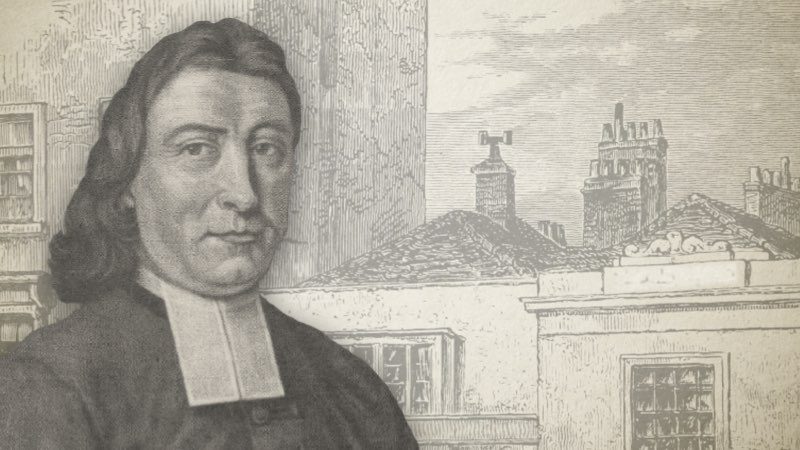
Chapter 13: Of Preaching With And Without Notes, Considered.
The Holy Ghost hath better gifts for men in the ministry whom Christ sends, than such have yet received, who can’t so much as exhort, much less instruct without their notes. A dry paper hath been found to be a very dead assistance in the work. Sententious, premeditated forms of preaching are a Scripture-less way of preaching. And what signifies a dressed matter upon the cushion, when I find it all out of order, where it should be better dressed upon my heart? What a piece of disorder is it to read a message that is to be spoken, Tit. 2:1, 15, I Thes. 2:2, Col. 4:3, Eph. 6:19, &c., and surely, if my heart were big with my message, I need not have recourse every half minute to the line above my thumb, or else run the hazard of being run out and silenced! If a man deliver his message experimentally and not notionally, it must come more from the sanctified treasure of the heart in matter, and less from the paper-help in form. Also, if a man spoke with his understanding more, he should speak from his memory less. If a man’s notes where well-written down upon the hidden man of the heart, I Pet. 3:4, by the finger of God’s Spirit, they would be more covertly laid, than that scandalous and common way of exposing them to every body’s view; or than that industrious concealment with hand or handkerchief, which some have studiously erected between the prying eyes of the galleries, and the copy of the sermon. Oh! Trust not thy pen, when you should be telling what is written on your heart. Let me here exhort you. Be not snow-balls in divinity to roll up numerous particulars, and lick up so many prepared sentences upon the sixth and seventh days of the week, lest you dissolve to your own loss, and to nobody’s gain, upon the Lord’s day. Remember, you’ll certainly stumble when you go about to tell us more than you feel that instant. The Lord knows that we have poor small doings among us! Lord! Pour down thy Spirit, that we may all blush and be ashamed to read sermons. Let me freely speak to you, Acts 2:29, 4:29, not let me freely read to you, says Peter. Let men read the text as Christ did, and it suffices, as to the reading part. Then as to the rest of the labour, close the book, and say unto the people, or speak to them after the manner that Christ did in his own preaching the Gospel. Luke 4:17-21. The greatest part of our reading preachers have done most mischief to applications, and the poor hearers suffer! Oh! That their eyes were opened! Some hearers who sit under the hour- glass or the pulpit watch {for few preachers by the measure of spending themselves know when to give out} have found, that Grace, it may be, has been set up, while the glass has had the far greatest part of its sands to run out, or the watch its greatest number of minutes to come on; but as the dust has declined, and the time elapsed, the grace-part of the sermon has sunk away with the time, till all has been lost and swallowed up in the unreformed management of use and application.
Objection: “Oh! Sir, why do you expose the reading of notes at this rate? 1. All have not the same memory. 2. As we have had the assistance of the Holy Ghost to prepare our notes in our studies so we may lawfully read to the people what has been so prepared of God.”
Answer: 1. Preaching the Gospel is from an unction of the understanding to open the Scriptures, and from a touch of God upon the heart, to open them too from what we feel of them. For Scriptures rip us up if we let them take their own way, let men who go by their authors say what they can. Preaching the right Gospel is not from an unction of the memory. He that practices Gospel-Orthodoxy in the pulpit by memory, acts more like a parrot-taught to utter words, than he speaks like a preacher of the Gospel. Promises and Experiences run all to the understanding and the heart, and not to the memory. {“For we cannot but speak the things which we have seen and heard.” Acts 4:20.}
2. Preaching the Gospel is expressed in the Word by speaking, and is an unction of the mouth. Eph. 6:19, Exod.4:11. It’s from the Spirit we have the true liberty, or free speech, Acts 2:29, the boldness, II Cor. 7:4, Acts 4:29, 31 and the confidence, Acts 28:31, as the Word is differently translated, and in each of the instances brought, is accommodated by the Holy Ghost to utterance in our pulpit-speech, Eph. 6:19, as it is plain to him who takes his Bible and consults the places. Now we may speak to men in the things of God without notes, if we have an understanding and utterance given us by the Spirit to know what we say, as we may speak to them in the things of men without notes. For instance, if men speak to one another about trade or news, they can speak without notes. And the truth is {to hold to the comparison} I can remember far more of the news from him that tells me the news, than from him that reads the news. If I have newspapers, {for I use similitudes, Hos. 12:10,} they are for mine eye not mine ear. So men’s notes in the pulpit are more fitted to the eye of other readers, than they are to the ear of our auditors. Reading by notes I have felt experimentally both in reader {inasmuch as 22 years ago I used to read my notes in preaching} and in hearers, to be the most unprofitable way of speaking. How can he that speaks and reads, think that I can profit much by him, unless he acted fairly, threw me down another copy of his notes and let me hear and behold, along with him that sees all penned down before him in the paper? Or as much of it {at least} as he reads unto me? For just lifting off his eye from the cushion towards the middle of a sentence that helps him out in the latter end of it, is not the gift which makes it cease to be reading. Let the preacher, I say, if reading be best, disperse copies of his notes, that we may be all of one piece, as many of us as can be instructed by a view of the manuscript, and let us all look upon it together. 3. As men have had the assistance of the Spirit in their notes, without notes to compose notes; so it’s plain they have not the assistance of the Spirit without their notes to deliver his own assistances unto us. Besides, if notes where the scriptural way of preaching, men should surely have a gift of the Spirit to read those notes, but they have no gift of the Spirit to read them. All worship should be carried on by immediate gifts of the Spirit, so far as God hath bestowed immediate gifts upon any; which proves that all should covet earnestly the best gifts. I Cor. 12:31. But now in notes and the scandalous indulging the life of them I may say, that that assistance of the Spirit of Christ which I’ll suppose they had before in composing them, is afterwards gone, at least sensibly abated in the worship. Hos. 5:6. And may not one reason of it be for want of occupying in their talent by meditation, and trust in the Lord, &c., who alone makes us able ministers of the New Testament, II Cor. 3:6, not of the letter {no, not of the letter in a cut of paper, though I am afraid men look too much at the letter, and therefore look so much to their notes} but of the Spirit? And an able minister of the New Testament of the Lord’s making by the Spirit, can never be by reading notes; that that kills may be copied on paper, wherein lies not the ability; but that which gives life is the Spirit who needs no paper, and which teaches the man, that he needs none at all neither. Men should occupy their talent by this trust, and not slight it by napkining it in a scroll of paper, and there reading it through a mere distrust indulged. To be sure, if ever these men have had the assistance of the Spirit in composing notes, II Cor. 3:5, they have had his assistance to another end than to read them; which may be done without any further measure of the Spirit, and then what are the dry things worth? To me the argument is plain, that if I have had a measure of assistance in private for Lord’s day work, it argues a most sinful distrust of my soul, if I do not look for an equal measure of the Spirit, not to say a greater measure of the Spirit in his farther gifts, when I come publicly to use these prepared helps of meditating the Scripture-arguments beforehand. Consequently, a greater measure of the Spirit, nay an equal measure of his help in the pulpit must be to preach without reading; for if by his help I studied them without reading, why not by his help, if I think I am a minister that he sends and owns, do I not deliver them, and why then ought I not to deliver them too, without reading? May it not be said, that after help in our studies, we indulge a simple distrust in the pulpit, and by our tying up ourselves to a set of words, do think we please man by keeping close to the argument, Gal. 1:10, while we displease God while running away from His assistance. Has not this distrust of farther gifts of the Spirit for utterance, upon trial of the Spirit’s help in our studies for argument, provoke the Lord to leave the ministry so much at this day, even in Orthodox pulpits, that it’s much to our lamentation? Has not flying to notes upon every sentence almost to be uttered, under a colour of refreshing memory, grieved the Spirit, in a deadening both the pulpit and auditory, that we may almost fear he is gone, and suspends his effectual operation? 4. Why should men’s souls so generally choose to be for yesterday’s cold meat now after so long a time upon Lord’s Days in the churches, though fire was under it yesterday; when as their minds are all agreed to put hot meat into their mouths, and to refresh their bodies upon Lord’s Days in their families with something that’s warm? Well then, that which comes hot from off the altar, warmed by the fire of our Great Sacrifice and brought in immediately from the minister’s own heart by the Lord the Spirit, is a soul-provision that certainly makes us thrive best; and not that which comes cold, after it’s strained through a man’s notes to chill it.
Hearers also may read better sermons at home than any are read in the pulpit at this day. Nevertheless, though they can read better than any are now preached, yet public preaching has more of God’s blessing to go along with it than any private reading, Rom. 10:17, because it has so solemn and express an institution in the written Word. II Tim. 4:2; Rev. 2:29; Acts 15:7, &c.
Most gracious Lord, pour forth thy Spirit. Lord Jesus, come quickly, that the human way of applications may wear off and vanish, and the dust of the prophet’s feet, who do not live for ever, Zech. 1:5, may be all thrown out of doors! Then shall the sanctuary be cleansed. Dan. 8:14.
THE END.
Joseph Hussey (1660-1728) was a Congregational preacher. He was converted to Christ in 1686 after reading Stephen Charnock’s, “The Existence And Attributes Of God.” In 1688, he was ordained to the Gospel Ministry and was appointed the Pastor of a church in Hitchen. In 1691, he was appointed the Pastor of a church in Cambridge. In 1719, he was appointed the Pastor of a church in Petticoat Lane, London. He nurtured high views of sovereign grace, setting out a clear case against the free offer of the gospel. His teachings on this subject were published in a book called, “God’s Operations Of Grace But No Offers Of His Grace” (1707).
Joseph Hussey, God's Operations Of Grace But No Offers Of His Grace (Complete)




